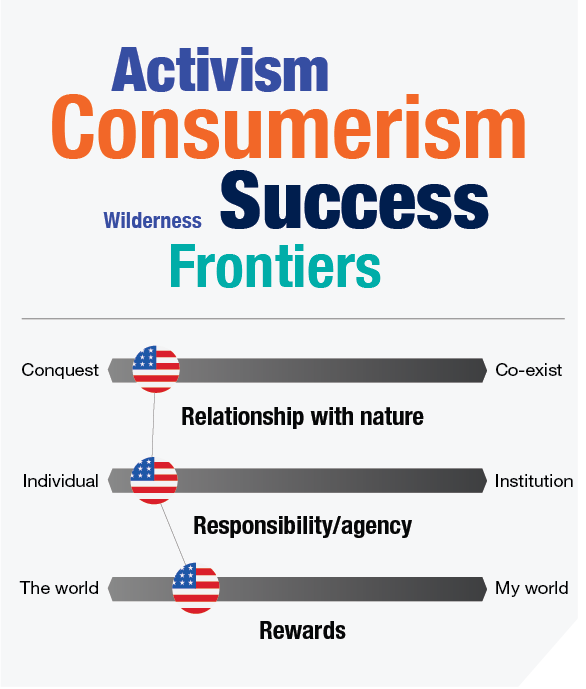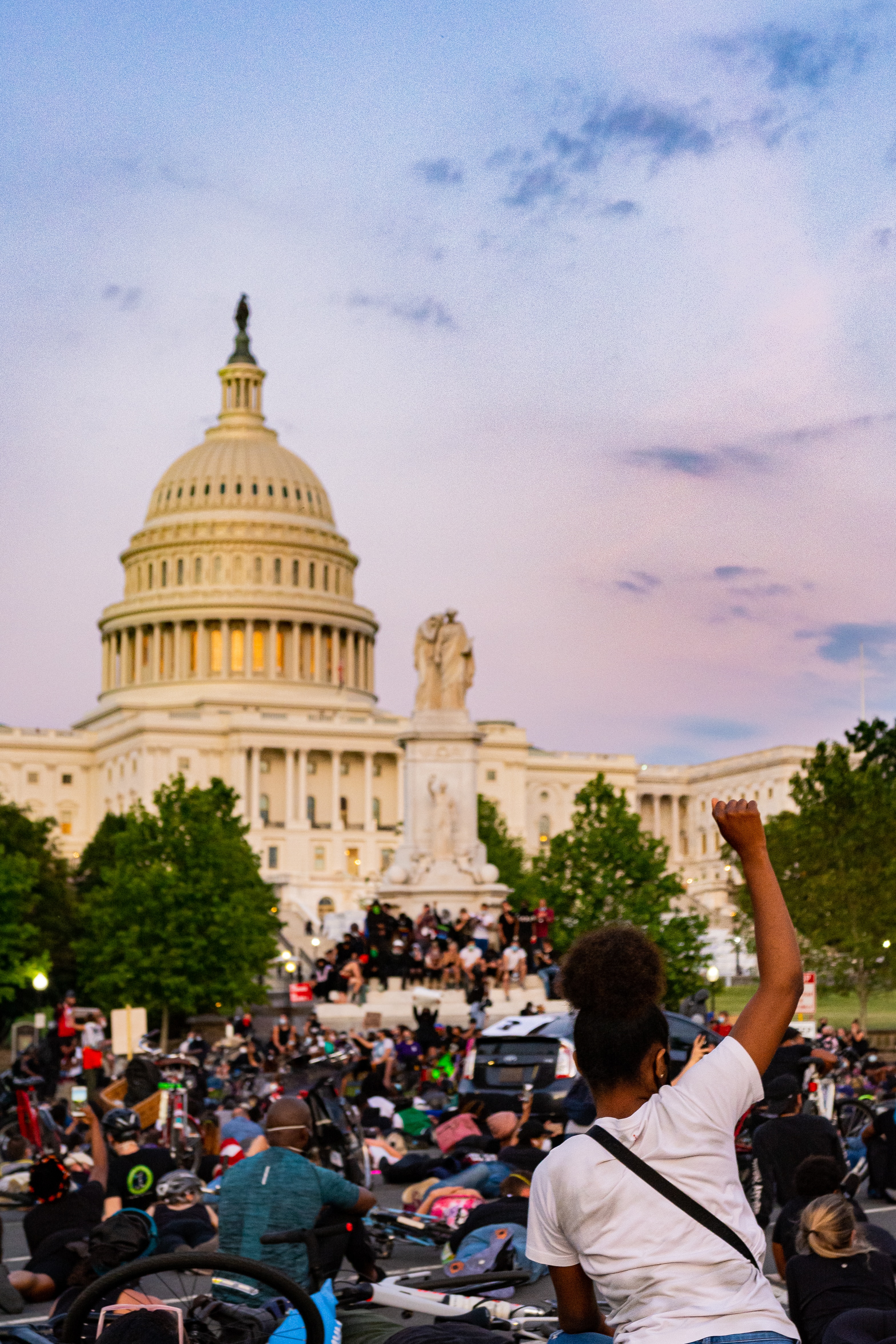

ESG across borders: United States of America
 If we examine the culture of ESG in the US, we can see a culture of activism, originating from a culture of conquest over nature: conquering frontiers, taming the wilderness… The individual takes on a very clear role in terms of owning responsibility, and when it comes to rewards, there is a willingness – even a sacrifice to some extent – to forgo immediate returns for a better future.
If we examine the culture of ESG in the US, we can see a culture of activism, originating from a culture of conquest over nature: conquering frontiers, taming the wilderness… The individual takes on a very clear role in terms of owning responsibility, and when it comes to rewards, there is a willingness – even a sacrifice to some extent – to forgo immediate returns for a better future.
Much of the emphasis around ESG is linked to consumerism and the need to flaunt success, very much part of the US social culture, which also means that there is a lot more focus on brand choices and consumer behaviour.
Polarisation
 Survey results from the US indicating Americans’ level of sustainability concern and attitudes towards ESG themes may not provide a clear picture, due to a high degree of fragmentation and a polarisation of views. But start to break down the data and a vast number of differing views emerge – indicative of a highly diverse culture.
Survey results from the US indicating Americans’ level of sustainability concern and attitudes towards ESG themes may not provide a clear picture, due to a high degree of fragmentation and a polarisation of views. But start to break down the data and a vast number of differing views emerge – indicative of a highly diverse culture.
The growing dominance of diversity and inclusion and other social sustainability themes in US society have all added an emphasis on individual activism. People are now increasingly aware of issues of inclusivity and are not shy to speak out when they see any kind of discrimination.
But deep political polarisation in the US has resulted in the three pillars of E, S and G taking on partisan tones. Diversity and inclusivity initiatives especially have faced a backlash from some corners. For some in US society, views around social equality, for example, are seen to challenge the very ethos of American values and the country’s national character.
As for many other issues in the US, ESG has become a red vs blue, or a Republican vs Democrat issue. As the US has a federal political structure, driven by different political leadership within different states, polarised views on ESG means the country is made up of a patchwork of policies and regulations. Americans in different states do not experience the same kind of policies and regulations which results in inconsistent access to, and support for, ESG measures – not to mention anti-ESG legislation even cropping up in some (Republican-controlled) states.[11]
Individual responsibility
 When it comes to ESG responsibility, the US’s highly individualistic culture creates a strong sense of individual ownership. It’s up to individuals rather than institutions to take action. But again, polarised views result in a vast array of action. Among one section of society, ESG issues invoke feelings of passion, earnestness and commitment. But there is also a significant chunk of the population for whom sustainability threats are either not a concern, not an immediate problem, or a largely overblown issue[12] – and who react with outrage to certain ESG measures, which are perceived to threaten their very American way of life.
When it comes to ESG responsibility, the US’s highly individualistic culture creates a strong sense of individual ownership. It’s up to individuals rather than institutions to take action. But again, polarised views result in a vast array of action. Among one section of society, ESG issues invoke feelings of passion, earnestness and commitment. But there is also a significant chunk of the population for whom sustainability threats are either not a concern, not an immediate problem, or a largely overblown issue[12] – and who react with outrage to certain ESG measures, which are perceived to threaten their very American way of life.
However, whether it’s forest fires on the West Coast, unseasonal snow or flooding, the growing incidence of natural calamities makes it increasingly difficult to deny the impact of climate change. When we spoke to our local experts in the US, almost everyone knew of someone, someone’s family, or someone’s home having been affected by some of these disasters. Two-thirds of Americans now say that unusual weather for the season has become more frequent (67%) and more intense (60%) in their area compared to 10 years ago.[13] Individual action also drives much of the adoption of sustainable practices. This happens through word of mouth, advocacy, the building of knowledge and awareness, and often through consumer choices. More and more people are willing to reject brands that do not prove their sustainability credentials. Like many ESG topics in the US however, views here are again polarised: a slim majority say instead that they want companies to stay out of social (52% agree) and political issues (58% agree).[14]
All the same, there remains a positive ‘shaming’ culture, with individuals calling out people who they see openly transgressing ESG expectations, and in a way, educating them. This is especially true of younger Americans, who have higher levels of awareness, education and knowledge about sustainability and less fragmentation in their views. They often lead the reform of older generations e.g. their parents’ generation. For example, one of our experts spoke about how, when she told her daughter that they’re planning to have a holiday in Hawaii, her daughter was outraged and said they shouldn’t be going to Hawaii – it’s a state where they treat their indigenous population poorly. Suddenly, something that wasn’t even in the set of ESG considerations became a topic as a result of the Gen Z daughter educating her Boomer parent.
My daughter was like ‘noooo’ when I told her we were planning a holiday in Hawaii. She was like ‘… do you know how they treat their indigenous people?’
Successful brand campaigns
 There is a lot of ESG activity within the US market, with successful brand campaigns focusing on themes of reuse, thrift and responsible consumption. One of our experts spoke about how, even for something as personal and important as weddings, we now see a growing trend of buying pre-loved wedding gowns and also people donating their own gowns after their wedding. Zero plastic has almost become a norm now, and more and more we see brands talking about things like ethical sourcing, renewable energy sources and so on.
There is a lot of ESG activity within the US market, with successful brand campaigns focusing on themes of reuse, thrift and responsible consumption. One of our experts spoke about how, even for something as personal and important as weddings, we now see a growing trend of buying pre-loved wedding gowns and also people donating their own gowns after their wedding. Zero plastic has almost become a norm now, and more and more we see brands talking about things like ethical sourcing, renewable energy sources and so on.
Notes
[12] Ipsos. 2022. “Environmental Sustainability: Who Cares?”
[14] Ipsos. 2023. “Ipsos Consumer Tracker - Wave 77”
Table of contents
- ESG across borders: the cultural context
- "Sustainability": All on the same page?
- Equality Kaleidoscope
- The climate of climate change opinion
- Applying cultural transferability analysis to ESG
- ESG across borders: United States of America
- ESG across borders: India
- ESG across borders: Brazil
- ESG across borders: South Africa
- ESG across borders: China
| Previous | Next |

![[Webinar] KEYS: What can we learn from what happened in 2025?](/sites/default/files/styles/list_item_image/public/ct/event/2025-12/keys-webinar-what-happened-in-2025-carousel.webp?itok=1gJKCCxx)
![[Webinar] KEYS: THE MIDDLE CLASS: In Crisis?](/sites/default/files/styles/list_item_image/public/ct/event/2025-10/middle-class-family-dinner-food-carousel.webp?itok=iD1QyX8n)
![[Webinar] KEYS: Global Trends - The Uneasy Decade](/sites/default/files/styles/list_item_image/public/2025-09/image/minisite/keys0925.png?itok=3oAiYcxm)